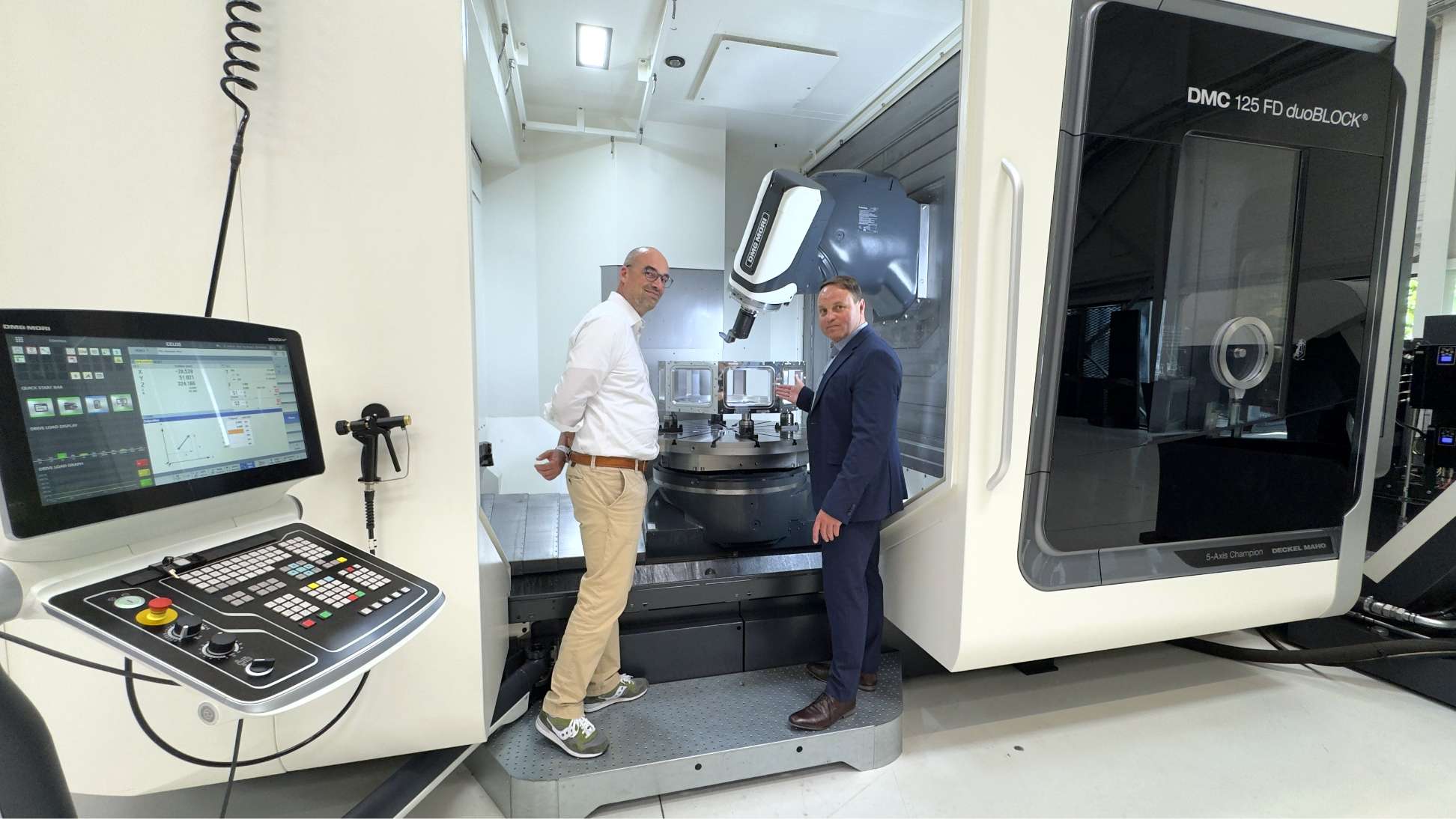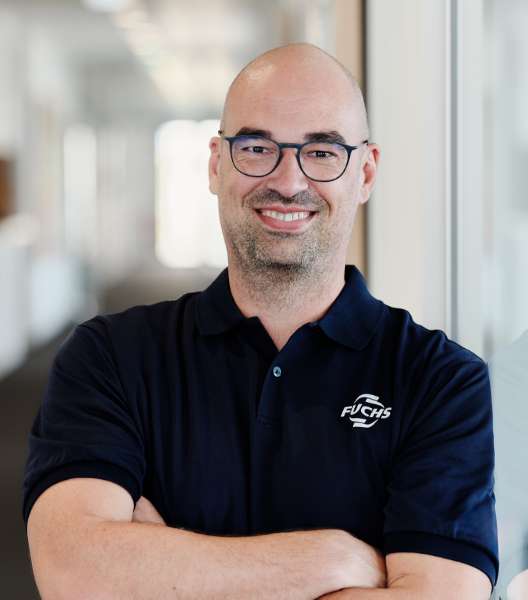Semiconductors are the basic building blocks of our modern lives; no electronic device can work without them. Demand is huge - and will only continue to grow. We sat down with Jens Tempel, from FUCHS and Bernd Dötterl, from DMG MORI, to discuss how their companies want to jointly shape the market for the most important technology of the 21st century.
Metal working fluids play an extremely important role for every machine tool: A tool mills through material and the lubricant cools both to ensure longer tool life and a better surface quality of the workpiece. “When a metal working fluid moves between components, it is also worked into the surface of the workpiece," explains Bernd Dötterl. "In most industries, this doesn't play a critical role and is neglected."
Dötterl's customers cannot neglect foreign particles. He is the Sales Manager for semiconductor industry machines at DMG MORI. In the semiconductor industry, it is very important to check how many foreign particles are worked into the surface during processing. “The components that our machines produce are later used under vacuum. This vacuum is so strong that it can detach foreign particles," explains Dötterl. “These particles then float freely through the air in a vacuum."
A blank slate
For customers in the field of EUV lithography, who use light and mirrors in their vacuum chambers to project nanometer-sized structures onto silicon wafers, such foreign particles are highly undesirable, as they distort the exposure image on the subsequent semiconductors. “I realized early on that the metal working fluid plays an essential role when it comes to the production of semiconductors,” says Dötterl. His colleague Michael Ziegler put him in touch with a lubricant specialist: FUCHS, with whom DMG MORI already had a long-standing technical partnership.

“I realized early on that the metal working fluid plays an essential role in the production of semiconductors.”
The cooperation between the two companies began back in 2014 with projects in China. FUCHS and DMG MORI then expanded their technology partnership in Europe in 2017, and FUCHS has been producing customized lubricants for DMG MORI since 2018. In 2021, Dötterl met Jens Tempel, the Global Key Account Manager for DMG MORI at FUCHS. “We started with a blank slate in metal working fluids," recalls Tempel. "We have now developed three solutions. With these, we also address a major unique selling point of DMG MORI, technical glass machining with the ULTRASONIC series."

Chip manufacturers should think of DMG MORI and FUCHS in the same sentence: Together, Jens Tempel (l.) and Bernd Dötterl want to position their companies as premium partners for exclusive semiconductor customers and components.
It's all about nanometers
One of the challenges in the semiconductor industry is precision: in contrast to other industries, it's all about nanometers. When you think of impurities, you don't think of grains of dust – which would be huge in scale - but of atoms. "For chip manufacturers, the issue of cleanliness runs through the entire process chain, right up to the machines and their individual parts made of aluminum, stainless steel or titanium," says Dötterl. "When manufacturing these parts, the metal working fluid and machine tool work hand in hand." When it comes to purity, the metal working fluid can be made more aggressive. "However, this can lead to corrosion on the machine tool," says Dötterl. That is why it is important to find a balance between workpiece cleanliness and corrosion protection.
"If our customers look for a metal working fluid on the global market, there is a risk that it will not work properly. In the worst-case scenario, the machine will rust, and we may be faced with warranty claims," explains Dötterl. Together with Tempel, he is therefore campaigning for customers to use FUCHS metal working fluid with DMG MORI machines to achieve optimum results. "Then we can also ensure that no damage occurs or that the service life of the machine is shortened," explains Dötterl. Tempel adds: "We want to communicate the added value of our collaboration to customers. We always present a package: The DMG MORI machine setup for the unique requirements of semiconductor combined with our lubricants. In principle, the customer can start production immediately."
Different degrees of purity
There are different degrees of purity for the metal working fluids. Together with DMG MORI, FUCHS has developed an application for ‘GRADE 1’. "This is the purest grade," says Tempel. For applications from ‘GRADE 2’ to "GRADE 5’, there is a ready-to-use product with a very high performance. All products have been tested for their performance at DMG MORI's Technology Center in Pfronten, so that customers can be sure that purity is not achieved at the expense of performance.
In addition to lubricants for DMG MORI machine tools used in the manufacture of components for chip production machines, FUCHS also offers lubricants for the operation of vacuum systems and clean rooms for chip production. These lubricants for greasing O-rings and lubricating ball bearings or linear guides come from NYE Lubricants, who became a member of the FUCHS Group in 2020. "This allows us to offer the complete portfolio," says Tempel. There are also products for cleaning and corrosion protection. This means that customers from the semiconductor industry can get the right lubricant from FUCHS for their entire supply chain – many of which were jointly developed with DMG MORI.

From challenger to premium partner
For the metal working fluid, Dötterl and Tempel are now looking for a partner with whom they can implement the combination of machine and lubricant in production. They will then have to prove over the next three to five years that the system works. “My aim is to launch our full package in this time and ensure that we can guarantee the purity of the machine over several years of production,” says Dötterl. The next step is to clean and preserve the machine and the third step is to ensure that all subsequent operating materials meet the cleanliness requirements.
The medium-term goal is for the FUCHS metal working fluid to become so popular and the package to work so well that semiconductor manufacturers think of DMG MORI and FUCHS in the same sentence. “Both companies are doing a lot and pulling out all the stops so that we can exploit the still relatively young industry and position ourselves as a premium partner for semiconductor customers and components,” says Dötterl. Tempel adds: “We want to stand up to the top dog in the metal working fluids sector, establish ourselves on the market and convince customers of the added value that we can offer as a full-service provider in the semiconductor sector.”

“We want to stand up to the top dog in the cooling lubricant sector and establish ourselves on the market.”
The partnership fits
The goal is to have FUCHS and DMG MORI appear together worldwide with the claim “FUCHS & DMG MORI ALL IN ONE - solutions for semiconductor applications”. “It is a great advantage that both companies are globally positioned,” says Dötterl. “This means we can use our many resources, including showrooms, to demonstrate to customers what our machines can do.” Dötterl and Tempel also see other similarities between FUCHS and DMG MORI: “We are both full-range suppliers and have a leading position in our field," says Tempel. "And we both have an absolute focus on our customers.”
“The topic of semiconductors has received a strong boost over the past five years, particularly due to increasing digitalization during the coronavirus pandemic and trends such as autonomous driving and AI”, says Dötterl. “We want to actively develop this business area and identify, develop, and provide market-specific solutions.” The industry is relatively young, and 15 years ago, nobody had today's developments on their radar. “We do have customers from the semiconductor industry who have been buying machines from us for more than ten years," says Dötterl. "But it's only recently that people have realized that there's real potential here.”



